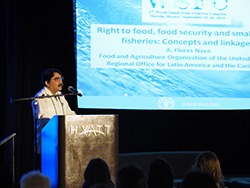Small-Scale Fisheries, Food Rights and Food Security: Dr. Alejandro Flores at the 2WSFC

While social, cultural and ecological aspects are essential in understanding the intricacies of small-scale fisheries, food security is often overlooked. In the plenary session on Food, Rights and Governance, Dr. Alejandro Flores of the FAO brought to attention the importance of considering small-scale fisheries' contributions to food security globally.
The concept of Right to Food (RTF) is a key concept in ensuring food security, as it provides a legal framework and enhances political commitments to fighting hunger. Dr. Flores stated that many nations have included RTF as part of their constitution, which has strengthened actions, particularly in Latin America where hunger has been dramatically reduced and the Millennium Development Goal has been met. The more recent concept of food sovereignty, which seeks to uphold the rights of peoples in determining their own food system in terms of governance, production, distribution and eating, has been integrated into the policies of four Latin American countries. Despite many advances, Dr. Flores indicated that new issues have arisen in the region, posing new challenges to food security, such as rising obesity rates. He believes that fisheries and aquaculture play a vital role in not only reducing hunger, but obesity as well, and Latin American countries must increase their consumption of fish and seafood.
During the discussion period, some concerns arose regarding the need to distinguish the contributions of small-scale fisheries to food security from those of large-scale fisheries. Dr. Flores recognized the need for this, and pointed out that it is currently difficult to do so due to a lack of information. He conceded that more involvement from the fisheries sector, and not just land-based food production, is needed at a policy level in terms of food security. Moreover, a fisher present at the conference questioned aquaculture's contribution to food security, especially the potential impacts it may have on small-scale fisheries. Currently, the FAO actively supports the sustainable development of aquaculture as a means to increase the availability of fish and reduce poverty in developing countries.
Flores' presentation provided a means to draw attention to the issue of food security, and an opportunity for more discussions to take place. Some important research gaps were highlighted - specifically the ways in which small-scale fisheries contribute to food security. Concepts such as food sovereignty and RTF may help in providing a lens by which to examine these issues.
Written by: Chloé Poitevin, MA Student, Department of Geography
Too Big Too Ignore (TBTI) is a research network knowledge mobilization partnership funded by Social Sciences and Humanities Research Council (SSHRC). For more information, please visit http://toobigtoignore.net/.